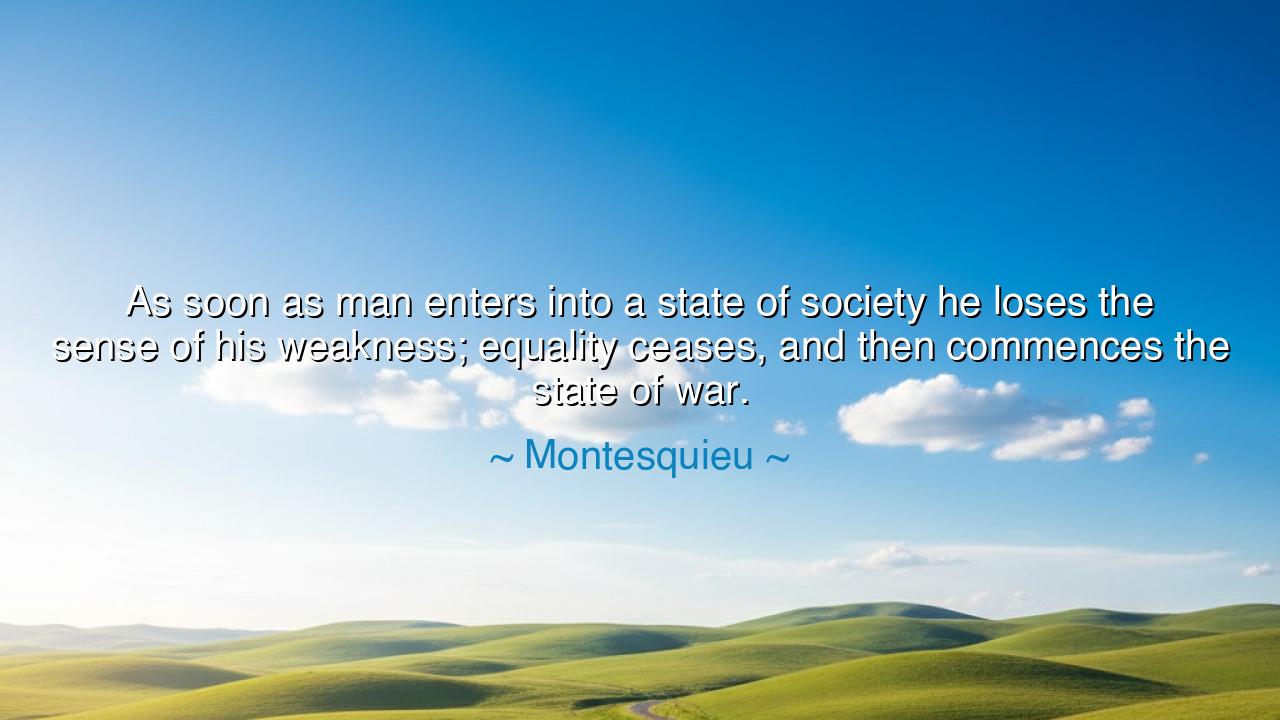
As soon as man enters into a state of society he loses the sense
As soon as man enters into a state of society he loses the sense of his weakness; equality ceases, and then commences the state of war.






In the words of Montesquieu, sage of the Enlightenment and seeker of balance in the affairs of humankind, we hear a warning that resounds through the corridors of history: “As soon as man enters into a state of society he loses the sense of his weakness; equality ceases, and then commences the state of war.” These words are not the cold observation of a philosopher detached from life—they are a lament, a mirror held to the soul of civilization. For Montesquieu, who studied the rise and fall of nations, saw that the moment man left his natural innocence to form societies, he gained power—but lost humility, and with it, the harmony that once bound him to his fellows.
To understand the meaning of this quote, one must look deeply into the heart of man. In the beginning, in the primal wilderness, all were equal before hunger, cold, and fear. Each man felt his weakness, and from that awareness grew compassion. They needed one another, and so they shared. But when men gathered into tribes, cities, and kingdoms—when they built walls and called them security, when they raised crowns and called them order—the delicate thread of equality began to fray. The strong grew confident; the cunning grew ambitious; the humble were forgotten. Thus, society, though born from cooperation, became the cradle of competition.
Montesquieu, in his great work The Spirit of the Laws, observed that the state of war is not born of nature, but of civilization itself. The savage may fear the tiger or the storm, but it is the citizen who learns to fear his neighbor. As soon as man is clothed in law, he begins to see not the unity of humanity, but the hierarchy of rank. The farmer looks to the noble; the noble looks to the king; and the king, seeing no equal upon earth, looks upon all as subjects. Thus, from the moment equality ceases, the spirit of rivalry, jealousy, and greed takes its place. Civilization refines man’s mind, but corrupts his soul.
One need only glance at the pages of history to see this truth written in blood. Consider Rome, that mighty empire whose citizens once called one another brothers. In her infancy, Rome was humble—a city of farmers and soldiers, bound by duty and simplicity. But as her borders expanded and her wealth overflowed, her citizens forgot the weakness that had once united them. The senators plotted, the generals turned upon one another, and ambition devoured the heart of the republic. The same empire that had once conquered nations fell victim to its own internal state of war—not of swords alone, but of pride, power, and corruption.
Yet, Montesquieu’s wisdom is not meant to cast despair upon the hearts of men. His warning is a call to awareness, not surrender. He reminds us that civilization, for all its beauty, is a fragile construct that must be tempered by virtue. Power, without humility, becomes tyranny. Wealth, without compassion, breeds injustice. Progress, without equality, is but the gilded mask of decay. The philosopher does not condemn society itself, but the forgetfulness that festers within it—the forgetting of weakness, the forgetting of shared humanity.
The lesson is therefore timeless: to preserve peace, one must remember fragility. Let every man, no matter how high, recall the days when he was weak, when he depended upon others, when kindness was his shield and cooperation his weapon. Let rulers govern not with arrogance but with restraint; let the strong protect rather than exploit. For in remembering our weakness, we recover our equality—and in recovering equality, we avert the war that always follows pride.
Even in our modern age, this wisdom rings true. Nations arm themselves in fear of one another, corporations consume the small and the poor, and individuals, obsessed with self, forget the collective good. The state of war that Montesquieu spoke of is not always waged with armies—it lives in hearts divided by envy, in neighbors turned to rivals, in societies that worship success more than justice. But if we, as individuals, choose humility over pride, cooperation over dominance, then we begin to heal the wound of civilization itself.
Thus, let these words be carried as a torch through the ages: “As soon as man enters into a state of society, he loses the sense of his weakness.” Let us not lose that sense. Let us remember that all power is borrowed, that all greatness rests upon the shoulders of others. To know our weakness is not shame, but wisdom. It is the seed of empathy, the root of peace, and the foundation of true strength. For only when man remembers his limits can he live not in a state of war, but in the eternal harmony for which he was first made.






AAdministratorAdministrator
Welcome, honored guests. Please leave a comment, we will respond soon